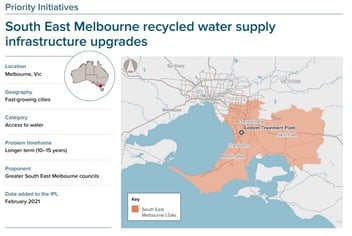Water sector sustainability relies on customers knowing the true cost of water
With ageing assets to maintain and growing populations to service, the Australian water industry needs to better engage the community about the true costs of providing and maintaining the infrastructure to supply water.
According to Infrastructure Australia’s (IA) 2019 Australian Infrastructure Audit, water users don’t understand how much the resource actually costs, whether it’s coming directly through their taps or indirectly through food and other products.
This has resulted in state-owned utilities keeping prices as low as possible to ensure customers are getting what they perceive as value for money.
“With the value of water poorly understood, governments have been reluctant to embrace the pricing reforms that are required to properly reflect the cost of provision and support rational investment,” the IA team wrote.
“Prices that better reflect the cost of water provision assist in managing demand for water and encourage operating cost efficiencies, facilitate investment, and provide a better basis for private sector participation in the urban water sector.”
Australian Water Association (AWA) CEO Jonathan McKeown said it is important for the sector to engage with the community to build water literacy and understanding about water security.
“We need more community engagement to ensure people are fully aware of alternative water sources that are fit for purpose, including water recycling," McKeown said.
"Australia needs transparent cost-reflective pricing of fit for purpose water services.
“Communities often do not value the cost of maintaining infrastructure, replacing ageing infrastructure, and the cost of treating water suitable for drinking.”
Rural recognition
McKeown said the AWA welcomed the audit’s focus on the inconsistency of service delivery between Australia’s urban centres and regional and remote communities.
Water and wastewater service providers in remote and regional areas face unique challenges, including costs that cannot be borne by their small customer base, which is typically spread over a large area.
This lack of scale also makes it difficult for regional water authorities to keep pace with their larger metro counterparts, who are investing in new technologies to improve their operations.
As a result, service in many of Australia’s remote communities doesn’t meet the United Nations’ Sustainable Development Goal (SDG) 6: clean water and sanitation for all.
"Many of our rural and remote communities desperately need new investment, infrastructure and management skills to meet SDG 6,” McKeown said.
“We need to ensure that regional and remote areas have an investment plan for maintaining facilities to provide drinking water that will meet Australian Drinking Water Guidelines. We need to develop an infrastructure investment framework to do that.
"AWA looks forward to reading the final recommendations on priority investments and reform recommendations that will presumably be included in the next phase of Infrastructure Australia's work.”
Opportunity knocks
While the audit found the water sector is facing unprecedented challenges – population growth, climate change and changing customer expectations among them – it also pointed to emerging opportunities.
For urban utilities, the need to renew ageing assets is a chance to rethink how water and wastewater services are delivered, and to use technology to improve efficiency and levels of service.
IA said there is also an opportunity to put water at the centre of Australian cities, using integrated water management to create sustainable spaces to live, work and visit. And there is scope to make better use of recycled water, greywater and stormwater sources.
“We need a national commitment to water security that engages all sources of water, and a better understanding of fit-for-purpose water,” McKeown said.
“We don’t need potable water for everything; we can recycle water for particular purposes.
“We need specific infrastructure investment policy and frameworks, a commitment to cost-reflective pricing, and steps towards the harmonisation of nationally consistent standards. And we need to bring the community on the journey of reforming how we use and access water.”
Infrastructure Australia is now calling for submissions in response to the challenges and opportunities identified in the audit.
Related podcast:
https://omny.fm/shows/australianwater/andrew-francis-on-delivering-water-infrastructure

